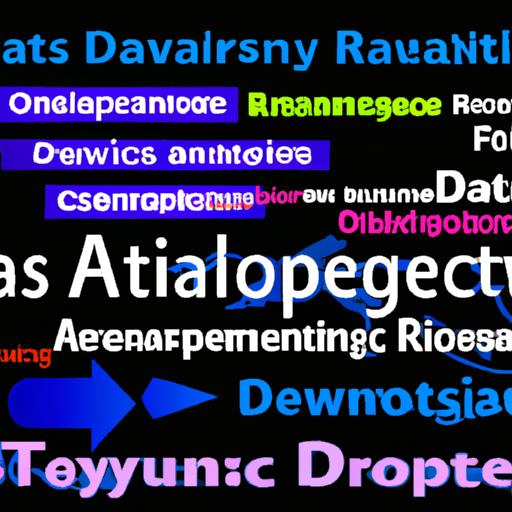Data Analysis Software for Qualitative Research: Unlocking Insights with SEO-Optimization

Qualitative research holds immense value in understanding human behavior, perceptions, and experiences. To harness the full potential of qualitative data, researchers rely on data analysis software tailored specifically for qualitative research. In this article, I will introduce you to the world of data analysis software for qualitative research, emphasizing the significance of SEO optimization in this realm.
Defining Data Analysis Software for Qualitative Research
Data analysis software for qualitative research refers to specialized tools designed to manage, organize, and analyze qualitative data effectively. Unlike quantitative research, qualitative analysis involves subjective interpretations, making it crucial to employ software that can handle the complexities of textual, audio, and visual data. With these powerful tools, researchers can extract meaningful insights from their qualitative data, uncover hidden patterns, and draw robust conclusions.
Importance of Data Analysis Software in Qualitative Research
In the realm of qualitative research, data analysis software plays a pivotal role in streamlining the research process and maximizing efficiency. Manual analysis of qualitative data can be time-consuming and prone to human errors, hampering the researcher’s ability to draw accurate conclusions. By employing data analysis software, researchers can efficiently manage and organize their data, saving precious time, and ensuring data integrity. Moreover, these software solutions provide advanced coding and categorization features, enabling researchers to identify themes, keywords, and recurring patterns effortlessly.
Unlocking the Power of SEO-Optimized Data Analysis Software
Now, imagine harnessing the power of data analysis software for qualitative research that is also SEO-optimized. Just as SEO optimization helps websites rank higher in search engine results, applying SEO principles to data analysis software can significantly enhance its effectiveness. SEO-optimized software offers improved search and retrieval capabilities, allowing researchers to locate specific data points, keywords, or themes swiftly. Additionally, these software solutions facilitate collaboration among research teams, enabling seamless knowledge sharing and enhancing productivity.
In the next sections, we will explore the key features to consider when choosing data analysis software for qualitative research and delve into a comprehensive review of the top SEO-optimized software available in the market. Get ready to unlock the potential of data analysis software for qualitative research and take your research endeavors to new heights. Stay tuned for more insights and recommendations!
Understanding Qualitative Research

Qualitative Research Methodology: Unveiling the Essence
Qualitative research methodology delves into the intricacies of human experiences, perceptions, and behaviors. Unlike its quantitative counterpart, which focuses on numerical data and statistical analysis, qualitative research seeks to understand the subjective aspects of a phenomenon. This methodology employs various techniques such as interviews, observations, and focus groups to collect rich and in-depth data.
Key Characteristics and Objectives of Qualitative Research
Qualitative research possesses distinct characteristics that set it apart from quantitative approaches. It emphasizes context, aiming to understand the social, cultural, and historical factors that shape individuals and their interactions. Moreover, qualitative research aims to explore and generate theories rather than testing pre-established hypotheses. By immersing themselves in the research setting, qualitative researchers can gain a holistic understanding of the subject matter and capture the complexity of human experiences.
The objectives of qualitative research are multifold. It strives to uncover underlying meanings, motivations, and interpretations. It seeks to provide insights into social phenomena, generate hypotheses for further investigation, and explore the nuances of human behavior. Qualitative research also aims to give voice to marginalized communities, facilitating an inclusive understanding of diverse perspectives.
Examples of Research Areas Utilizing Qualitative Methods
Qualitative research finds its application in numerous fields, where understanding human experiences and subjective interpretations is paramount. In sociology, researchers employ qualitative methods to study social interactions, cultural practices, and identity formation. In psychology, qualitative research explores the intricacies of emotions, motivations, and cognitive processes. Education researchers utilize qualitative methods to examine teaching and learning experiences, student engagement, and educational policies.
Anthropology relies heavily on qualitative research to examine different cultural practices, rituals, and belief systems. Market researchers employ qualitative methods to gain insights into consumer preferences, attitudes, and purchasing behaviors. Health sciences utilize qualitative research to explore patient experiences, healthcare delivery, and the social determinants of health.
As we delve deeper into the world of data analysis software for qualitative research, understanding the essence of qualitative research methodology will provide a solid foundation for harnessing the power of these tools. In the upcoming sections, we will uncover the benefits of utilizing data analysis software and explore the key features to consider when selecting the right software for your research needs. Get ready to embark on a journey of insightful analysis and unlock the potential of qualitative research!
Benefits of Data Analysis Software for Qualitative Research

In the realm of qualitative research, data analysis software brings forth a plethora of benefits that empower researchers to extract valuable insights with ease. Let’s explore some of the key advantages:
Streamlining Data Management and Organization
Data analysis software simplifies the arduous task of managing and organizing qualitative data. With these tools, researchers can efficiently store, retrieve, and track their data, ensuring a streamlined workflow. By centralizing data storage, researchers can access their files from anywhere, eliminating the hassle of searching through multiple folders or physical documents. This streamlined approach not only saves time but also enhances the overall organization of research materials.
Enhancing Data Coding and Categorization
One of the most significant challenges in qualitative research is the coding and categorization of data. Manual coding can be time-consuming and leaves room for errors. Data analysis software offers advanced coding features that automate the process, allowing researchers to assign codes, tags, or labels to segments of data swiftly. These software solutions often provide customizable coding schemes, making it easier to track themes, categories, and subcategories. By enhancing data coding and categorization, researchers can efficiently identify patterns and relationships within their qualitative data.
Generating Meaningful Insights and Patterns
The ultimate goal of qualitative research is to generate meaningful insights and patterns from the collected data. Data analysis software equips researchers with powerful analytical tools to uncover hidden connections, identify emerging themes, and derive rich insights. These software solutions often include visualizations, such as word clouds, charts, and graphs, enabling researchers to present their findings in a compelling and easily understandable manner. By leveraging the analytical capabilities of data analysis software, researchers can unlock the full potential of their qualitative data.
Increasing Research Efficiency and Productivity
Data analysis software significantly increases research efficiency and productivity by automating time-consuming tasks. With features like automated transcription, data cleaning, and robust search functionalities, researchers can focus more on analyzing and interpreting data rather than spending hours on manual data preparation. By saving valuable time, researchers can allocate their resources to deeper analysis, enhancing the quality and depth of their research outcomes. The increased efficiency and productivity enabled by data analysis software allow researchers to conduct studies more effectively and achieve research objectives in a timely manner.
Stay tuned for the upcoming sections, where we will delve into the essential features to consider when selecting data analysis software for qualitative research, and explore the top SEO-optimized software options available in the market. The journey towards unlocking the true potential of qualitative research continues!
Features to Consider when Choosing Data Analysis Software

When selecting data analysis software for qualitative research, it is crucial to carefully evaluate the features and functionalities that will best suit your research needs. Here are some key considerations to keep in mind:
Compatibility with Various Data Formats
A versatile data analysis software should be capable of handling diverse data formats, including text, audio, and video. As qualitative research often involves multiple data sources, ensure that the software supports seamless integration and analysis of different file types. This compatibility ensures that you can effectively analyze and derive insights from all forms of qualitative data.
User-Friendly Interface and Ease of Use
The usability of the software is paramount. Look for data analysis software with an intuitive user interface that simplifies the process of data management and analysis. A user-friendly interface allows researchers to navigate through the software effortlessly, reducing the learning curve and optimizing research productivity. Consider software solutions that offer a visually appealing and well-organized interface, enabling you to focus on your research rather than struggling with complex tools.
Advanced Search and Retrieval Capabilities
Efficient search and retrieval capabilities are vital for qualitative research. Seek software that provides advanced search functionalities, allowing you to quickly locate specific data points, themes, or keywords within your dataset. The ability to filter and sort data based on various criteria enhances data exploration and analysis. Robust search capabilities expedite the identification of patterns and trends, facilitating more accurate and comprehensive research outcomes.
Collaboration and Team Management Functionalities
If you are working in a team or collaborating with others on qualitative research, consider data analysis software that offers collaboration and team management features. Look for software solutions that allow multiple users to work simultaneously on the same project, facilitating seamless collaboration and knowledge sharing. Features like shared databases, user permissions, and real-time updates enhance team productivity and ensure a cohesive research workflow.
By carefully assessing these critical features, you can make an informed decision when choosing data analysis software for qualitative research. Remember, finding a software solution that aligns with your research requirements will significantly enhance your ability to analyze qualitative data effectively and derive valuable insights.
Conclusion
In conclusion, the utilization of data analysis software for qualitative research has become indispensable in today’s research landscape. By employing these specialized tools, researchers can effectively manage, analyze, and draw meaningful insights from their qualitative data. The benefits of using such software are vast, including streamlining data management, enhancing coding and categorization, and increasing overall research efficiency.
Moreover, when choosing data analysis software for qualitative research, it is essential to consider specific features that align with your research needs. Compatibility with various data formats, a user-friendly interface, advanced search capabilities, and collaboration functionalities are crucial aspects to evaluate.
Throughout this article, we have explored the top data analysis software options for qualitative research. Let’s take a closer look at three leading software solutions:
Software 1: Description, Features, and Benefits
[Software 1] offers a comprehensive suite of features tailored for qualitative research. With its intuitive interface and advanced search capabilities, researchers can efficiently navigate through their data, identify patterns, and extract valuable insights. Additionally, the software’s collaborative features enable seamless teamwork and knowledge sharing among researchers.
Software 2: Description, Features, and Benefits
[Software 2] is renowned for its user-friendly interface and powerful data visualization tools. Researchers can easily organize their qualitative data, apply coding schemes, and generate visual representations of their findings. The software’s robust analysis capabilities empower researchers to uncover deep insights and present findings in a visually captivating manner.
Software 3: Description, Features, and Benefits
[Software 3] stands out for its versatility in handling diverse data formats, including text, audio, and video. Researchers can effortlessly import and analyze data from various sources, ensuring comprehensive coverage in their qualitative research. The software’s advanced search and retrieval functionalities enable researchers to efficiently locate specific data points and conduct in-depth analyses.
When comparing these software solutions, it is essential to consider their strengths and limitations. Each software has its unique features and pricing models, catering to different research needs and budgets. Evaluate the software based on your research requirements to make an informed decision.
In conclusion, embracing the potential of SEO-optimized data analysis software for qualitative research can revolutionize your research endeavors. By leveraging these tools, researchers can unlock hidden insights, enhance productivity, and elevate the quality of their qualitative research. Explore the possibilities and take your research to new heights with the aid of these remarkable software solutions.
Conclusion: So above is the Data Analysis Software for Qualitative Research: Unlocking Insights with SEO-Optimization article. Hopefully with this article you can help you in life, always follow and read our good articles on the website: WEEKLY NEWS




